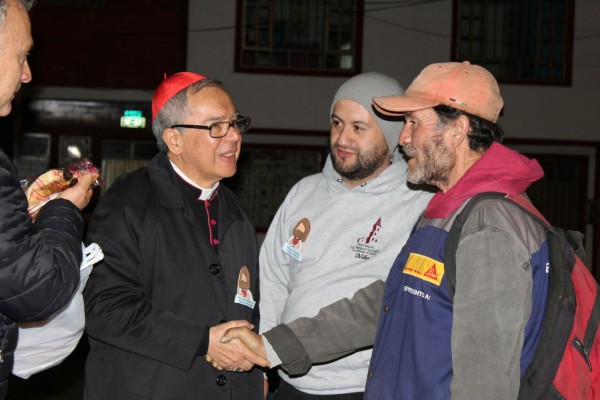
Recently the Cardinal of Bogotá, Archbishop Luis José Rueda Aparicio, together with his two auxiliary bishops (Germán Medina and Alejandro Díaz), made a three-day pastoral visit to the Episcopal Deanery of San Pablo, in the southeast of the Colombian capital. La Resurrection Parish, which is run by the Community of Saint Paul, is located in that Episcopal Deanery.
During the visit, a meeting of the cardinal with young people from the Deanery was organized, which took place in the La Resurrección parish. After the meeting, Bishop Luis José Rueda and his auxiliary bishops accompanied the young people of the parish on the “Aguapanela Route”: they spent almost three hours walking through the neighborhood, greeting the homeless people they met and giving them a glass of hot “aguapanela” and a chicken sandwich.
It was a beautiful experience, and a great opportunity for the Cardinal to learn first-hand the reality of those who live on the streets in this sector of Bogotá, mostly people who consume psychoactive substances. At the end of the Route, archbishop Luis José expressed his satisfaction, pointing out that these activities are essential for the Church to get closer to those who are most vulnerable in our society.
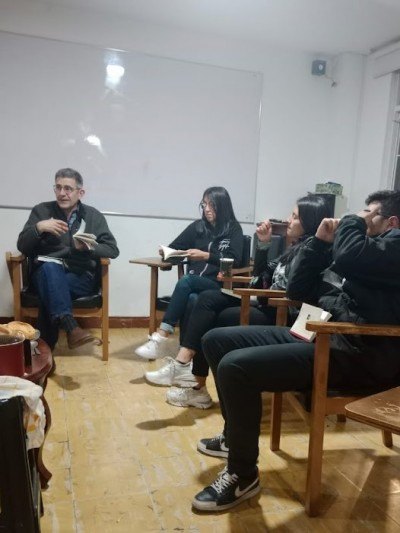
In September 2022 (it will soon be a year!), in “La Resurrección” parish, in Bogotá, we decided to start a new project, simple but exciting, without knowing at that time if it would have much of a future: a book club. The underlying idea was to foster a love of literature among young people from these neighborhoods from the South of Bogotá and offer, to those who wanted it, the opportunity to read great works of literature, discuss them in group, examine them in depth and, thus, be able to enjoy them. It seemed to us an original idea, since often in the pastoral plans of our parishes we do not take into account the promotion of culture, as if that were not also an urgent task (especially in contexts where other vital needs leave little time for intellectual formation and the arts).
Since then, the Book Club has grown, as has the enthusiasm of those who have joined it: currently it is a consolidated group of 14 people, mostly young men and women, who meet approximately once a month to share what we have discovered while reading a novel. During this time we have read and commented "The Pearl", by John Steinbeck, "Chronicle of a Death Foretold", by García Márquez, "The Metamorphosis", by Kafka, "The Death of Iván Ilich", by Tolstoy, "The Old Man and the Sea", by Hemingway, "Novel of Chess", by Stefan Zweig... as you can see, already a small collection of great works that, without a doubt, have enriched the lives of those who participate in our Book Club. The list of suggested books for future reading is already quite long!
A group from Wisconsin recently visited the members of the CSP in Bogota, to build ties of brotherhood between Colombia and the US.
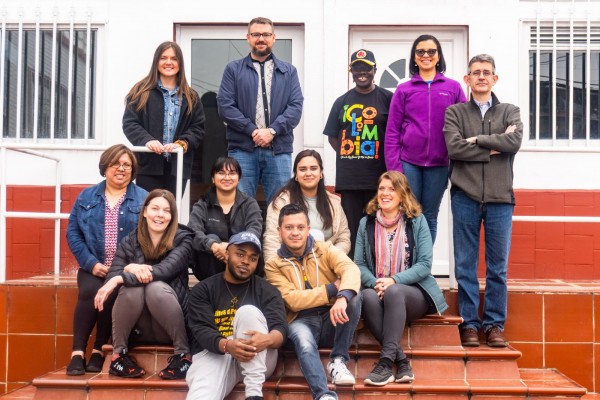
From May 22 to 30, a group of 10 people from Wisconsin made an inspiring visit to “La Resurrección” Parish in Bogota, which is run by priests from the Community of Saint Paul. The trip was organized by the World Mission Office of the Archdiocese of Milwaukee, and the people who made up the group were parishioners from various parishes in southeastern Wisconsin.
Their week in Bogota was intense: they were able to see some emblematic locations in the Colombian capital, and, above all, they got an idea of the day-to-day parish life in “La Resurrección”: they participated in several celebrations of the Eucharist; shared meetings with different parish groups; one night they accompanied the group of volunteers who carry out the “Ruta del Aguapanela” through the streets of the neighborhood; they had a couple of worjshops about the Church in Latin America and Colombia, and, above all, they established friendships with members of our parish, here in Bogota.
It was, in short, a beautiful experience of ecclesial fraternity—of truly understanding that we all can be “friends in the Lord”. In the end, both those from the US and those from Colombia were able to verify that what unites us, as members of One Church, is much more significant than what divides us.
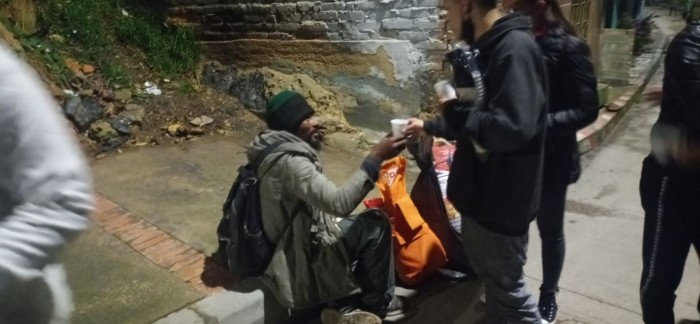
Six or seven months ago we started a new project in La Resurrección parish in Bogotá: on the last Thursday of each month we prepare some sixty sandwiches, fill several thermoses with aguapanela (hot water sweetened with panela from sugar cane) and with a group of volunteers we go out at night to walk around the neighborhood. As we meet street dwellers and homeless people who are spending the night outdoors, we offer them a hot glass of aguapanela and a sandwich—and then we talk with them for a while. Most of the men and women we encounter are drug addicts who have fallen into the consumption of psychoactive substances, which is one of the reasons why they have ended up living on the streets. We call this initiative “la Ruta del Aguapanela”, the aguapanela route.
Our task is simply to meet the homeless, offer them the minimum consolation of a little food and, over time, perhaps in some cases where the friendship created allows for it, propose a rehabilitation itinerary for those who ask for it.
Most of the volunteers who participate in this activity are adolescents and young people from the parish, and there is no doubt that this initiative also has an educational and pedagogical component for them: they become aware of the reality of their neighborhoods, and they can see firsthand the devastating effects drugs have on those who fall under their spell.
Every first Thursday, when we finish the Route, we are tired: it has been two or three hours of going up and down the steep streets of these neighborhoods located in the hills in the South of Bogotá, carrying bags with food and thermos, and it is cold, and sometimes it rains. However, each month, when we finish “la Ruta”, the atmosphere among those of us who have shared the experience is fraternal and joyful: no one complains. On the contrary, there is a sincere satisfaction for having invested a little of our time getting closer to the most marginalized, to people who are invisible to many—and having tried to be for them a presence of the mercy of God, even if is through a simple plastic glass with hot aguapanela.
With the arrival in Colombia of Fr. Michael Wolfe to work at La Resurrección parish
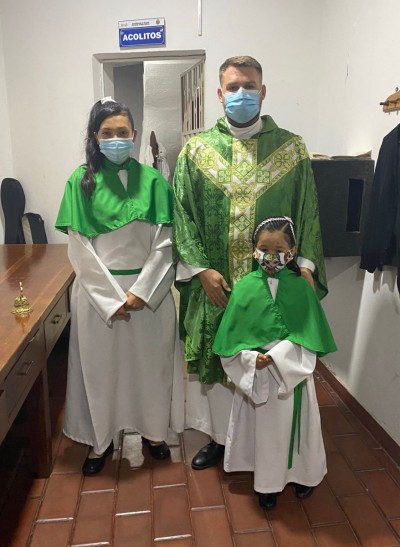
In the middle of last October Fr. Michael Wolfe moved from the Dominican Republic—where he finished his work as pastor of La Sagrada Familia, in Sabana Yegua—to Bogotá, Colombia. Mike, a priest of the Archdiocese of Milwaukee and a member of the Community of Saint Paul, arrives in Bogotá to work in La Resurrección parish, in the south of the Colombian capital, together with Fr. Martí Colom. The CSP has been present in La Resurrección since 2016.
Now, with Mike’s arrival, the presence of two priests will help to better develop the pastoral and human promotion tasks that we have been carrying out in the three neighborhoods that make up the parish territory. They include the celebration of the sacraments in the parish’s three centers of worship, the organization of the various pastoral ministries and also the social projects that are carried out at “Casa Garavito”, the CSP’s community development center located in El Pesebre neighborhood.
The CSP begins a new program for senior citizens in El Pesebre neighborhood of the Colombian capital
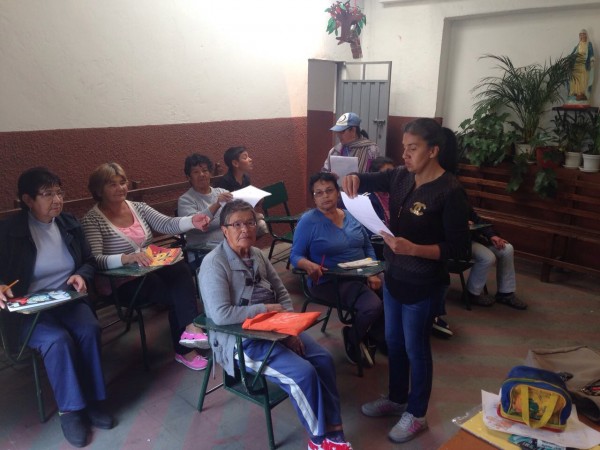
Last August we informed in this blog that the Community of St. Paul had started an after-school program for children in El Pesebre neighborhood in Bogotá. This program has a double goal: first, to help academically children aged 8 to 12 who need assistance with their studies; secondly, to offer them a safe environment where they can go in the afternoons and thus avoid that, by being on the street, they may fall into consumption of drugs. The project has been functioning with normality since its beginning. What we never expected was that such a program would be the trigger for another one: seeing that the parish facilities of the neighborhood opened several afternoons a week for the children, a few senior citizens came to us with a simple petition: «Can you teach us as well?»
It turns out that several grandparents in the district, who were born in rural provinces of the country and moved to Bogotá many decades ago, have had a long life of hard work and have never had the time to care for their intellectual formation. Some are illiterate, others know how to read and write, but barely, and do not have many knowledge of mathematics, history, geography…
We searched for a teacher from the same area willing to take on this task, and at the beginning of March we opened our new Educational Program for the Elderly. It operates every Saturday morning, and a dozen of grandmothers (they seem to be more interested than the men!) and one grandfather are already enrolled. They do not miss one class, are very attentive (in fact, they take their studies very seriously). For us it is a real joy to see them week after week, sitting in their desks and learning so many things that when they were children never had the opportunity to study.
The Community of Saint Paul starts an after school program in Pesebre, a neighborhood in the south of Bogotá
Since last January, members of the CSP have worked in La Resurrección Parish, located in the southern part of Bogotá. The parish territory includes La Resurrección, Granjas de San Pablo and Pesebre neighborhoods: these are humble, working-class areas of the Colombian capital, mostly layer 2 on the socioeconomic classification of the City of Bogota (which lists the neighborhoods of the capital from 1 to 6, with 1 being the areas with least resources and 6 the wealthiest).
These sectors face a remarkable variety of challenges, from the overcrowding of people in homes of poor quality to the difficulties of families in obtaining quality health services; from the few job opportunities for young people to the abandonment of many elderly. However, after listening in various meetings to the population of these neighborhoods, we soon found that one problem concerns them more than any other: the insecurity prevailing in the streets, directly related to the consumption of narcotic substances by many young people, who commit crimes to obtain resources to be able to use drugs. Drug dependence, in turn linked to the lack of opportunities that many young people face, is a real epidemic in these neighborhoods, where everyone recognizes the existence of several "ollas"—literally, “cooking pots”, that is, spots where drugs are sold in the streets of the capital by the nets of trafficking.
Many people have told us about a dramatic new concern: increased drug use among children of progressively younger ages. If a few years ago those who fell into drug dependence were generally kids older than sixteen or seventeen, the need of the drug dealers to expand the sale of their substances has now made it common that children aged nine, ten and eleven may start using them.
While recognizing the magnitude of the problem, and that all our efforts will just be a drop of water in a great ocean, we considered what to do to help, even in a modest way, to curb this trend. We decided to offer tutoring classes in the evenings, on the premises of the parish in the Pesebre neighborhood. We started in late July: fifteen children between 8 and 12 years were enrolled on the first day, and we hope that this service will keep growing. Part of the problem is that many children who go to school in the morning are by themselves when they come home at two or three in the afternoon, since their parents are away at work, many until late into the night. These children then have no one to help them do their homework or to prevent them from leaving and wandering the streets until dusk, which obviously makes it easier for them to end up falling into the networks of consumption. Our proposal is very simple: to provide a space where these children can go after school, and where they will be helped to advance in their studies, with tutoring and room assignments, and thus perhaps prevent drug dependence from taking over their lives. We have just started. We hope that this becomes a long-term project that may bear some fruit!






